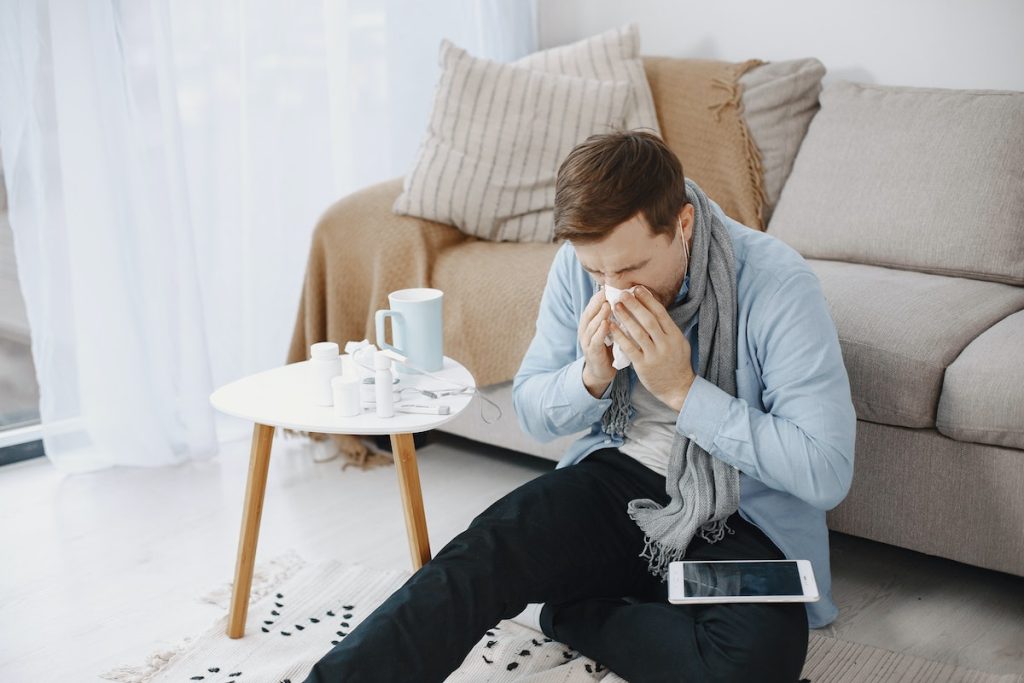- Minimize exposure to pollen and dust by keeping windows and doors closed, investing in air filters, and vacuuming regularly.
- Clean your home regularly to reduce the accumulation of allergens such as pet dander, mold, and mildew.
- Utilize air purifiers and allergen-proof bedding to reduce allergens in the home.
- Keep moisture levels low by fixing any leaks and using a dehumidifier.
- Don’t forget to regularly clean appliances such as air conditioners, dryers, and dishwashers.
As the seasons change, it’s not uncommon for many people to experience seasonal allergies. Itchy eyes, runny nose, and sneezing can be a nuisance, especially when trying to enjoy your time at home. The good news is that there are steps you can take to manage seasonal allergies in your home. This guide will discuss five tips to help you manage seasonal allergies in your home.
1. Minimize Exposure to Pollen and Dust
Pollen and dust are two of the biggest culprits of seasonal allergies. You can take a few simple steps to minimize your exposure to these allergens. To limit the amount of pollen in your home, close all windows and doors when possible. You may also consider investing in a high-quality air filter for your HVAC system. Additionally, vacuum and dust your home regularly to keep dust levels low.
2. Clean Your Home Regularly

In addition to dust, several other allergens can accumulate in your home over time. For example, pet dander, mold, and mildew can trigger allergic reactions. To keep these allergens at bay, cleaning your home regularly is essential. This includes wiping down surfaces, washing your bedding and curtains, and cleaning your carpets and upholstery. You may also want to consider using a dehumidifier to reduce moisture levels in your home, which can help prevent the growth of mold and mildew.
3. Utilize Air Purifiers and Allergen-Proof Bedding
Air purifiers can be a great tool for managing seasonal allergies in your home. These devices work by removing allergens from the air, making it easier for you to breathe. You can also invest in allergen-proof bedding to prevent dust mites and other allergens from accumulating in your bed. This can be particularly helpful if you suffer from nighttime allergies.
4. Keep Moisture Levels Low In the Home
As mentioned earlier, moisture can be a breeding ground for mold and mildew, triggering allergic reactions. To keep moisture levels low in your home, fix any leaks or water damage as soon as possible. You may also want to consider using a dehumidifier to keep humidity levels under control. Also, ensure to properly ventilate your bathroom and kitchen to prevent excess moisture from building up.
5. Don’t Neglect Cleaning Appliances
Your appliances can also be a source of allergens if they’re not cleaned regularly. For example, your air conditioning unit can accumulate dust and pollen, which can then be circulated throughout your home. To prevent this, make sure to clean your appliances regularly. This includes your air conditioner, your dryer, and your dishwasher. Keeping these appliances clean can help reduce the number of allergens in your home.
Here are some appliances you should regularly clean:
Air Conditioner
Your air conditioner can be a significant source of allergens in your home, as it circulates air throughout your space. It’s essential to regularly clean the filter on your AC unit, as this will help remove dust and pollen from the circulated air. You should also clean other unit components, such as fan blades, coils, and drain pan. You can purchase a commercial cleaner from a hardware store or use an all-purpose cleaner made from vinegar and water. Additionally, ensure that you have regular maintenance checks for your AC system so it runs efficiently with no dirt or debris build-up.
Dryer

Your dryer can also be a source of allergens, as it circulates lint and other particles throughout your home. To help reduce the number of allergens in your space, clean out your lint trap after every use. You should also vacuum the machine’s drum at least twice a year. This will help remove any dust and dirt that build up over time. Additionally, if you notice any unusual smells coming from your dryer, you may need to have it serviced by a professional cleaner or technician.
Dishwasher
Your dishwasher is another appliance that can contribute to allergies in your home. If not cleaned regularly, food particles can accumulate in the filter and pipes and cause bacteria to form. Recycle with hot water every week to keep your dishwasher clean and allergens-free. Additionally, scrub the inside of the dishwasher with soap and water once a month. This will help remove leftover food particles and prevent mold from forming in the pipelines.
Oven
Your oven can be a hotspot for allergens, as grease, food particles, and other debris can accumulate in the interior. To keep your oven clean and reduce any allergens in your home, it’s essential to clean it regularly with a professional oven cleaner. A professional cleaner will help remove built-up grease and grime from the interior, and any food particles stuck to the walls or racks. Additionally, ensure that you wipe down the exterior of your oven every week with soapy water and a cloth. This will help keep it free from dust and dirt build-up.
Final Thoughts
Managing seasonal allergies in your home can be challenging, but it’s not impossible. The steps outlined in this guide can help minimize exposure to allergens and improve your overall quality of life. Remember to keep your home clean and well-ventilated, invest in high-quality air purifiers and bedding, and keep moisture levels under control. With a little effort, you can enjoy your time at home without worrying about seasonal allergies.





